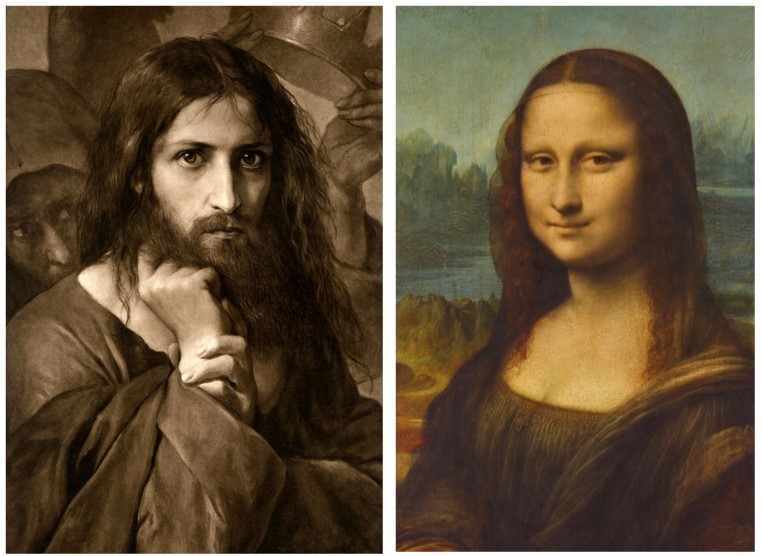by John Hartley

How does Leonardo’s masterpiece, arguably representative of the fatal juncture of Western Art, provide the philosophical basis for pornography? And how does the lost work of an obscure German painter seek to correct what Pavel Florensky called ‘dis-integrated personality’?
In 1888, Georg Cornicelius, a relatively obscure German artist known primarily for his landscapes, produced the portrait “Christ Tempted by Satan.” Cornicelius’ background in capturing vast vistas is brought to bear on Christ’s faculties of perception: the universal reality of nature is transposed upon the personal perspective of Christ.
In the third and final temptation in the wilderness, Satan offers Christ dominion over all the kingdoms of the earth if he will only bow down and worship him. The result of the interplay of proportions gives Christ’s eyes a striking depth—a metaphysical quality—that seems to penetrate the very essence of the beholder.
This temptation is profound, proposing a shortcut to salvation that bypasses the necessary suffering and sacrificial death Christ must endure for the sake of the world. According to St. James, temptation arises from concupiscence, the innate human proclivity towards moral evil. As Dostoevsky’s Grand Inquisitor accuses Christ of burdening humanity with the heavy responsibility of free will, and consequently responsible for the disordering of nature, Satan aims to arouse in Christ the concupiscence of the eyes—the desire for personal control over the visible world.
If evil arises as the will freely yielded to the one who seeks humanity’s eternal ruin, then all of temptation, it seems, is contained here within a single portrait. *Admittedly, there is a lack of critical opinion on this work (what would Morgan Meis make of this painting, one wonders?). Read more »

 Among the ideas in the history of philosophy most worthy of an eye-roll is Aristotle’s claim that the study of metaphysics is the highest form of eudaimonia (variously translated as “happiness” or “flourishing”) of which human beings are capable. The metaphysician is allegedly happier than even the philosopher who makes a well-lived life the sole focus of inquiry. “Arrogant,” self-serving,” and “implausible” come immediately to mind as a first response to the argument. It’s not at all obvious that philosophers, let alone metaphysicians, are happier than anyone else nor is it obvious why the investigation of metaphysical matters is more joyful or conducive to flourishing than the investigation of other subjects.
Among the ideas in the history of philosophy most worthy of an eye-roll is Aristotle’s claim that the study of metaphysics is the highest form of eudaimonia (variously translated as “happiness” or “flourishing”) of which human beings are capable. The metaphysician is allegedly happier than even the philosopher who makes a well-lived life the sole focus of inquiry. “Arrogant,” self-serving,” and “implausible” come immediately to mind as a first response to the argument. It’s not at all obvious that philosophers, let alone metaphysicians, are happier than anyone else nor is it obvious why the investigation of metaphysical matters is more joyful or conducive to flourishing than the investigation of other subjects.